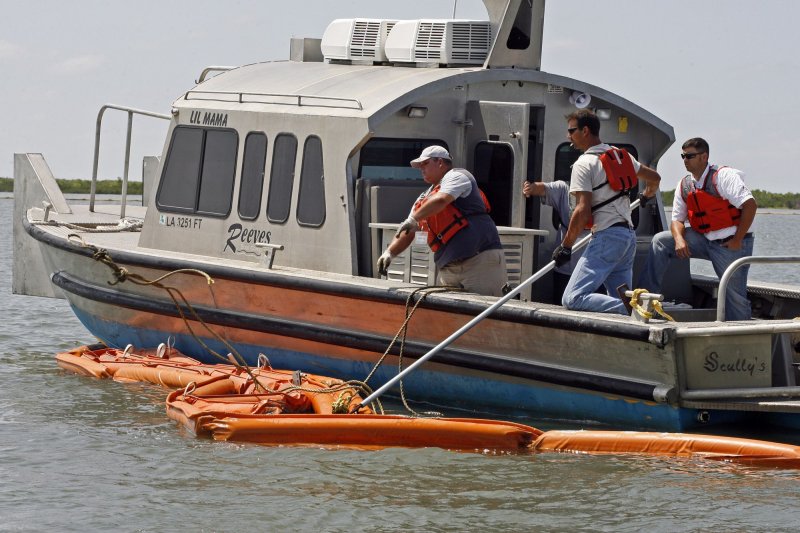1 of 2 | Workers capture an oil containment boom that broke away from its mooring in Terrebonne Bay in south La., July 11, 2010. UPI/A.J. Sisco.. |
License Photo
VENICE, La., July 12 (UPI) -- British oil company BP said Monday it has completed the installation of a new sealing cap on the Deep Water Horizon well in the Gulf of Mexico.
The move clears the way for testing to begin Tuesday on the integrity of the well, BP said on its Web site. The tests should show whether a quick end is in sight for the oil gushing from its deep water well in the Gulf of Mexico, the company said.
Doug Settles, BP's chief operating officer, said with the new cap in place the systems that have been collecting the gushing oil could be shut down and valves on the new cap would be closed to stop the oil flow outright, The New York Times reported.
Once those valves are closed, if tests show the pressure rising and holding -- indicating there is no significant damage along the length of the 13,000-feet well bore -- the valves could remain closed, ending the three-month flow that has resulted in an environmental disaster in the gulf region, the Times said.
"The best-case scenario: The pressures rise to the point we anticipate they would. We'd likely be able to keep the well shut in," the Times quoted Suttles as saying at a morning briefing.
He said scientists from the U.S. Department of Energy would help analyze the test results.
However, if tests show pressure in the well remains low, Suttles said, it would indicate a problem with the "integrity" of the well -- the valves would have to be reopened, oil would again gush from the well and the collection systems would have to be restarted, the Times reported.
The newspaper said the collection systems would have to operate until the company completes work on relief wells to permanently seal the well, which might not happen for weeks.
National Incident Commander Thad Allen issued a statement Monday saying the measurements to be taken Tuesday during a well integrity test "will provide valuable information about the condition of the well below the sea level and help determine whether or not it is possible to shut the well for a period of time, such as during a hurricane or bad weather, between now and when the relief wells are complete."
Allen said the test is likely to run for 6 to 48 hours "or more depending on the measurements that are observed."
Earlier, a leader of the commission charged with investigating the gulf oil spill said he's disappointed with the response but is withholding judgment for now.
"The oil industry has developed breathtaking technology in terms of what it can do: go down 5,000 feet, go out in all directions from below the sea sub-surface," William Reilly told CNN. "And one has to ask the question, 'Why this big difference? Why haven't we done better in putting resources into response?' ... We ought to have been better equipped to deal with oil on the surface of the ocean than we are. And that's my principal reaction to the response."
Reilly, a former Environmental Protection Agency administrator, and former Florida Sen. Bob Graham are co-chairmen of the National Oil Spill Commission, which was to conduct its first public meeting Monday.
"Given the resources that were around, which as I say I think were wholly inadequate to the challenge, I'll wait and form my judgment after I do a little more homework," Reilly said.















